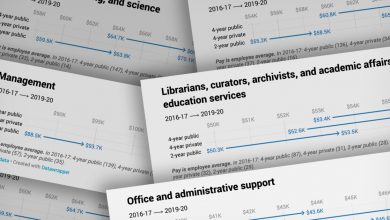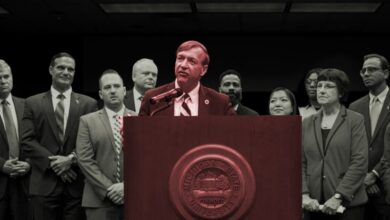Some States Want to Reshape Tenure. This Time, They Might Succeed.

A proposal in North Dakota would pilot a new vision for tenure at two public colleges — giving presidents, not faculty members, the power to sign off on performance evaluations of tenured professors.
Republican state lawmakers have introduced bills that would undo or amend tenure for years, saying that faculty members shouldn’t get lifetime job security with few strings attached. Typically, higher-ed leaders push back against attacks on tenure, saying that it is essential for protecting academic freedom. But there’s something unusual about North Dakota’s post-tenure review legislation.
A college president was involved in writing and strongly promoting the bill.
Such an origin story is distinct from historical trends, said John K. Wilson, who was a 2019-20 fellow with the University of California National Center for Free Speech and Civic Engagement. “That’s something that’s really quite radical and new and makes this particular era extraordinarily dangerous for tenure and academic freedom,” said Wilson, a scholar who studies academic freedom and tenure.
Texas and Florida are also looking at faculty tenure. With powerful Republican politicians leading the charge, these tenure bills could have a higher chance of succeeding than similar proposals in past years.
In Texas, Lt. Gov. Dan Patrick has made clear that “eliminating tenure” is one of his top priorities this legislative session. In Florida, HB 999 — the higher-ed legislation whose provisions have been championed by Gov. Ron DeSantis — would also target post-tenure review, empowering each college’s board of trustees to play a role.
In Iowa, a proposed ban on tenure stalled in January after college officials and business leaders expressed concerns. But the lawmaker who introduced it warned colleges that he and his colleagues were “paying attention” to growing criticisms of higher ed and questions about whether campuses and classrooms are hostile to conservative views.
Republican politicians targeting tenure have cited grievances with course content, such as teaching about race, and concerns that tenure permits faculty members to be less productive. Stephen D. Easton, the college president who expressed support for the North Dakota bill, meanwhile, said he wants to ensure students are satisfied with their education.
For Wilson, these legislative proposals represent a “new era” in the history of American higher education that is “unprecedented.”
“We’ve never seen anything like this before,” Wilson said.
A Push for Accountability
The pilot program reshaping post-tenure review in North Dakota would directly affect two institutions, Dickinson State University and Bismarck State College.
Easton, Dickinson State’s leader, told a legislative committee last month that changing post-tenure review to a process managed by college presidents would ensure tenured faculty members are held accountable if they are unproductive.

Dickinson State U.
Easton said the new process would also look at professors who are “non-revenue generating.” The bill proposes that tenured faculty members must bring in “more tuition or grant revenue” through teaching and research than the cost of their compensation and benefits.
“We have elevated the rights of non-productive tenured faculty members over students who pay their salaries through tuition, [and] we have elevated their rights over taxpayers who pay a significant portion of their salaries,” Easton said during his testimony. “Something needs to be done.”
Easton declined to comment further on the legislation in an interview with The Chronicle, citing the State Board of Higher Education’s newly announced opposition to the bill. Douglas J. Jensen, Bismarck State’s president, did not take a position on the bill.
State Rep. Mike Lefor, the bill’s sponsor and the leader of the Republican House majority, said during testimony that he believes it is appropriate for presidents to have the opportunity to review their employees.
“Tenure should not now or ever be a lifetime appointment,” Lefor said. “They should be held more accountable to administration rather than their faculty members.”
The Dickinson State Faculty Senate voted last month to support a measure by the North Dakota Council of College Faculties opposing the bill, and several faculty members spoke against the legislation during testimony. Bismarck’s Faculty Senate also submitted testimony critical of the bill. The resolution by the Council of College Faculties, which represents 11 North Dakota campuses, cites concerns that changes to post-tenure review would deter potential hires and undermine faculty morale.
If passed, the North Dakota bill could present a logistical issue for college presidents, said Michael Harris, a professor of higher education at Southern Methodist University. On top of their other day-to-day responsibilities, it wouldn’t be feasible for college presidents to manage post-tenure review, Harris said.
Among the tenure proposals advancing in the current legislative session, North Dakota’s is the furthest along. The bill passed out of committee last month and will go to the full House for a vote. In Texas, Lt. Gov. Patrick labeled his proposal to end tenure “Senate Bill 18,” but a bill hasn’t yet been introduced.
Florida’s proposal to alter evaluations for tenured professors, introduced February 21, builds on a 2022 law that established a five-year post-tenure review cycle. That law charged Florida’s Board of Regents, the governing body for the State University System of Florida, with developing a policy to implement the changes, which the board plans to vote on this month.
The new bill would give campus trustees the authority to review any faculty member’s tenure status and allow colleges to initiate a post-tenure review at any time for cause.
‘Weighing Heavily’
Even if the proposals in North Dakota, Florida, and Texas don’t end up becoming law, attempts to target tenure can still do damage, higher ed experts said.
Anita Levy, a senior program officer at the American Association of University Professors, called the latest efforts more “disturbing” than in years past. The AAUP testified against the North Dakota legislation.
Public colleges are poised to suffer most, said Richard Chait, a professor of higher education in the Harvard Graduate School of Education. Private institutions will be more easily able to attract faculty and pursue research that may be perceived as controversial, Chait said.
Concerns about academic freedom and tenure are weighing heavily on the minds of faculty who are teaching in states where Republican politicians are taking on public higher education, Harris said.
“I used to say that for the most part, academic freedom is an important principle that we need to uphold, but it’s not one that your average faculty on a daily basis had to think about,” Harris said. “If you are a faculty member of a public university in Florida right now, you are absolutely thinking about that. You’re absolutely thinking about your tenure protections.”
Faculty tenure is easy prey for politicians because it is not common among other industries, Harris said. And when tenure does come under fire, it’s difficult for professors to fight back.
“Faculty have tried to push back, faculty senates have tried to push back, but that’s a faculty senate resolution versus a piece of legislation,” Harris said. “It’s not exactly a fair fight.”
But the current political landscape doesn’t solely demonstrate contempt for tenure on the part of legislators, Chait said. College leaders and faculty members need to stop pointing the finger at legislators and start looking at who elected them, he said.
“This is symptomatic — and dramatically so — of a disdain and contempt for colleges and universities on the part of publicly elected officials who are presumably reflecting the views of their constituents,” Chait said. “If higher education needed it — and it surely doesn’t — a clear signal that public universities are losing public support, this is among the most demonstrable sources of evidence that we have a problem.”
Source link






